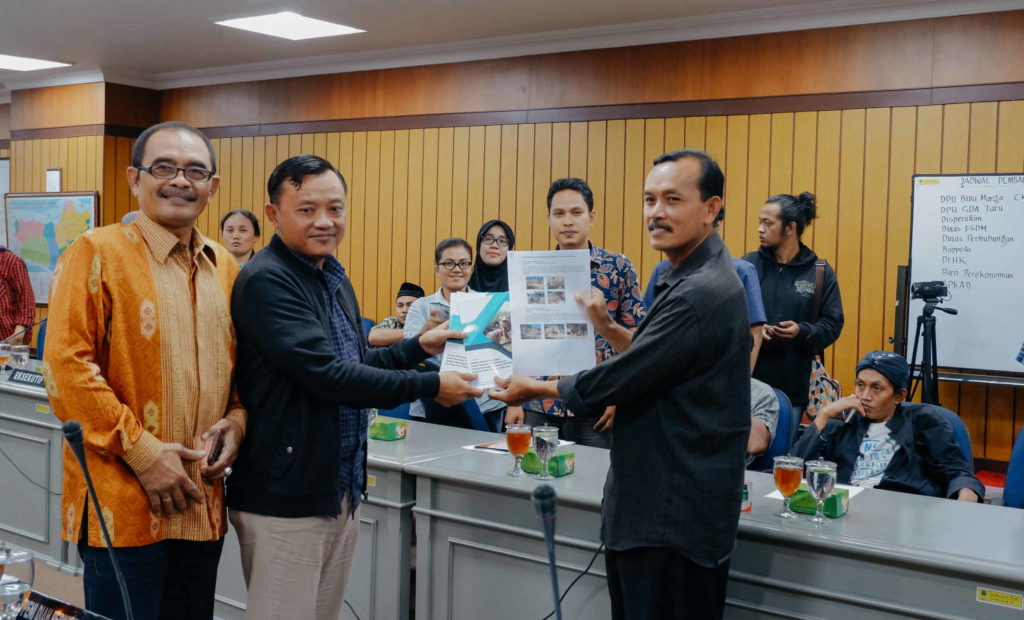
Semarang – Currently the Special Committee (Pansus) for the Draft Regional Regulation (Raperda) of the Central Java Provincial Medium-Term Development Plan (RPJMD) 2018 – 2023 is discussing intensely the regional development planning policy document for a period of 5 (five) years which contains the elaboration of the vision, mission and programs of the elected Governor of Central Java, Ganjar Pranowo, which has been synchronized with the technocratic design that has been compiled by the Regional Development Planning, Research and Development Agency (Bappeda) of Central Java Province. The Special Committee targets that in the near future the Raperda RPJMD will soon be passed into a Perda as the legal protection for implementing programs and activities of the Central Java Provincial Government (Pemprov) for the next 5 (five) years.
Remind the strategic importance of the RPJMD, a number of elements of civil society who are members of the Civil Society Alliance for Spatial Planning and Development in Central Java convey a number of ideas as input for the special committee and at the same time urge that the RPJMD of Central Java Province be truly inclusive, fair and sustainable.
These points of thought are the result of reading and analysis by civil society on the latest published draft RPJMD and based on conditions and realities in society. The findings of the civil society alliance show that the current draft RPJMD has not answered a number of main issues that should be the priority of the government in the future.
Gunretno, Coordinator of the Kendeng Mountains Caring Community Network (JMPPK), revealed that the draft RPJMD, when contextualized with the Kendeng Mountains area, is not in line with the Strategic Environmental Assessment (KLHS) regarding the Policy for Sustainable Use and Management of the Kendeng Mountains. KLHS Phase II, for example, has recommended that the areas of Juwana, Jepara, Kudus, Pati, Rembang and Blora (Wanarakuti), which initially relied on the mining sector, should be transformed into areas oriented towards superior cultivation and conservation sectors, which rely on the restoration of areas that have already experienced damage, to restore the function of recharge or water infiltration in the Kendeng Mountains area.
“However, in the Draft RPJMD the direction of development in the Rembang and Blora (Banglor) regions relies on the main leading sectors of mining and agroforestry (forest product processing) which are supported by an integrated tourism sector (nature and culture).” Gunretno explained.
Gunretno urged the special committee to really accommodate the recommendations of KLHS I and II, so that efforts to restore the function of water recharge / absorption can really be achieved.
“It is fitting for the government to care about the preservation of the Kendeng Mountains, immediately implement the results of the KLHS recommendations, including by pouring them into the Central Java development plan.” Gunretno said.
Zaenal Arifin, Director of the Legal Aid Institute (LBH) Semarang, said that the Central Java RPJMD should at least include a program to form a monitoring, supervision and control space team to carry out litigation and / or non-litigation actions to address illegal businesses in the mining and forestry sector; pouring out an effort to review and evaluate mining activities in Central Java, including carrying out closings if existing mining activities are not in accordance with the carrying capacity and carrying capacity of the environment; and making the Principle of Free, Prior and Informed Consent (FPIC) or the free, prior and informed consent of development programs as one of the main principles in development planning.
Zaenal reminds the government not to be trapped in pursuing economic growth and to only focus on infrastructure development alone which ignores the carrying capacity of the environment. It must focus on policies that promote sustainability, including water resources, which have significance for social life and economic activities of the community (especially the agricultural sector).
“Economic growth is rising, but for whom? Do not let economic growth only be enjoyed by a handful of people, and instead widen inequality and slowly kill farmers, fishermen and other marginalized communities, “explained Zaenal.
On the other hand, the development of Central Java must prioritize the improvement of good governance. Transparency supported by the provision of disaggregated data as well as data that is always updated so that development orientation and policies become quality because they are based on detailed, valid and measurable data. Of course, this data must be easily accessible to the public, which is in line with the spirit of Law No. 14/2018 on Freedom of Information (UU KIP). Government accountability must also be reflected in efforts to provide public services in line with the mandate of Law Number 25 of 2009 concerning Public Services.
Dian Puspitasari, Director of LRC-KJHAM, reminded that the Central Java Provincial RPJMD includes a program to improve access and quality of protection for women and children through prevention efforts against violence against women and children; reducing the risk of violence against women and children; and providing integrated services for victims of violence according to standards and integrated with basic services, social protection programs, poverty reduction programs and the application of policies in schools.
“Of course, regional budgets that are gender responsive and responsive to marginalized communities, including people with disabilities, must be a priority for the development of Central Java Province for the next 5 (five) years.” concluded Dian.
In addition, a number of issues related to improving the transportation system, protecting fisherwomen, improving the system for procuring goods and services, and regional fiscal policies have not escaped the attention of the Central Java civil society alliance.
Contact Person:
Zainal Arifin (081391282443)